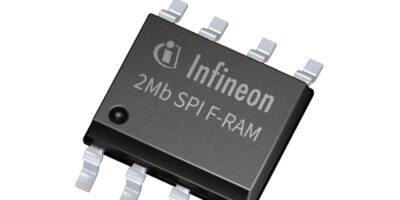Infineon introduces radiation-tolerant memory portfolio for low Earth orbit missions
Nearly 10,000 satellites currently circle our planet in low Earth orbit (LEO), delivering internet access, earth observation, communications, weather information, and more data back to earth. Compared to traditional geostationary Earth orbit (GEO) systems, LEO satellites are launched in larger numbers to achieve sufficient coverage and operate in a less severe radiation environment. As such LEO satellites require different electrical components compared to their traditional GEO counterparts. To support the development of these applications, Infineon is introducing a new portfolio of radiation-tolerant memory products tailored for the rapidly growing NewSpace market.
NewSpace refers to the commercialisation of space exploration by private companies and startups, often with less governmental oversight than traditional space programs. Driven by the rising demand for global connectivity (direct-to-cell), NewSpace initiatives aim to combine LEO satellite constellations with the Internet of Things (IoT) to create a more connected and efficient world. These missions typically rely on smaller satellites, ranging from nano-sats to 250 kg Sats, and are shorter in mission duration and less expensive, enabling the deployment of large-scale LEO constellations. With lower launch costs and reduced radiation exposure in LEO, many NewSpace applications can benefit from commercial off-the-shelf (COTS) components that deliver robust performance without requiring traditional military or aerospace qualifications.
Infineon’s NewSpace memory portfolio includes three product families: low-power, radiation-tolerant F-RAMs; QSPI NOR flash memories with 256 Mbit and 512 Mbit densities; and 256 Mbit/512 Mbit pseudo-static RAM (pSRAM). These devices offer an optimal combination of performance and reliability while supporting reduced size, weight, power, and cost benefits (SWaP-c). The F-RAMs operate across a wide MIL temperature range of -55°C to +125 °C, while the NOR Flash and pSRAM devices support a range of -40°C to +125°C. Radiation tolerance demonstrates a total ionizing dose (TID) rating of 50 krad(Si) for the F-RAMs, 30 krad(Si) for the NOR Flash, and 100 krad(Si) for the pSRAM. Additional benefits include single lot date code and 100 percent electrical testing to ensure reliable mission operation. With these characteristics, Infineon’s memory products are ideal for short-duration, high-redundancy, and large-scale LEO constellations.




